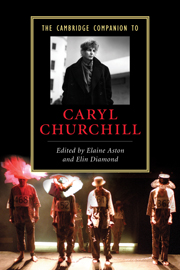Book contents
- Frontmatter
- 1 Introduction: on Caryl Churchill
- 2 On feminist and sexual politics
- 3 On owning and owing: Caryl Churchill and the nightmare of capital
- 4 On the challenge of revolution
- 5 On text and dance: new questions and new forms
- 6 On Caryl Churchill’s ecological drama: right to poison the wasps?
- 7 On performance and selfhood in Caryl Churchill
- 8 On Churchill and terror
- 9 On collaboration: ‘not ordinary, not safe’
- 10 On Churchill’s influences
- Select bibliography
- Index
10 - On Churchill’s influences
Published online by Cambridge University Press: 28 March 2010
- Frontmatter
- 1 Introduction: on Caryl Churchill
- 2 On feminist and sexual politics
- 3 On owning and owing: Caryl Churchill and the nightmare of capital
- 4 On the challenge of revolution
- 5 On text and dance: new questions and new forms
- 6 On Caryl Churchill’s ecological drama: right to poison the wasps?
- 7 On performance and selfhood in Caryl Churchill
- 8 On Churchill and terror
- 9 On collaboration: ‘not ordinary, not safe’
- 10 On Churchill’s influences
- Select bibliography
- Index
Summary
In an article published to coincide with Caryl Churchill's seventieth birthday, playwright Mark Ravenhill remarked, 'of all the major forces in British playwriting, I can think of no one else who is regarded with such affection and respect by her peers'. A decade earlier, in an article attempting to discover 'The Playwrights' Playwright', four of the nine writers surveyed chose Churchill as the playwright who most inspired them. Theatre critic David Benedict places her only behind Harold Pinter and David Hare in the public's affections, while Benedict Nightingale considers her 'the most gloriously original, preposterously gifted of all British dramatists'. In 1999, novelist Margaret Forster chose Top Girls as her 'play of the millennium' and more recently actress Sophie Okonedo when asked which living person she most admired chose Caryl Churchill. A sign of the esteem in which she is held may be found in the fact that the Royal Court Theatre, with which she has been associated since 1972, held not one but two seasons of her work in the 2000s. In 2002, to accompany A Number in the main house, Identical Twins, Not Not Not Not Not Enough Oxygen, and This is a Chair were performed in the Theatre Upstairs, alongside readings of Seagulls, Three More Sleepless Nights, Moving Clocks Go Slow and Owners. In 2008, to mark her seventieth birthday, ten playwrights directed staged readings of ten of her plays: Owners, Light Shining in Buckinghamshire, Vinegar Tom, Top Girls, Three More Sleepless Nights, Ice Cream, The Skriker, Blue Heart, Far Away and A Number.
- Type
- Chapter
- Information
- The Cambridge Companion to Caryl Churchill , pp. 163 - 179Publisher: Cambridge University PressPrint publication year: 2009



